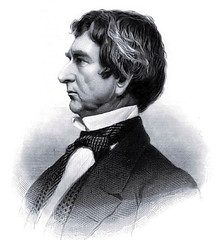
March 15, 1861 U.S. Secretary of State William H. Seward responds to the communication requesting a meeting from the CSA Commissioners with a memorandum explaining that the position of the administration is that the CSA states remain a part of the United States and are not a foreign government with whom diplomatic relations ought to [...]
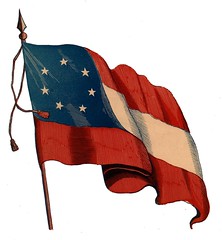
March 12, 1861 The Confederate States of America Commissioners Forsyth and Crawford send a sealed request for a meeting with Secretary of State Seward for the purpose of presenting their credentials as representatives of a foreign government and to make overtures for the opening of negotiations between the CSA and the USA.
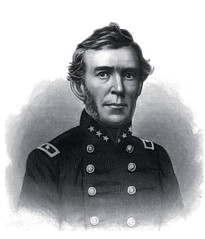
March 11, 1861 The Constitution of the Confederate States of America is adopted unanimously. Braxton Bragg assumes command of Florida forces
March 9, 1861 The Coinage Bill is passed by the Confederate Congress, authorizing up to 50 million dollars in Confederate currency to be printed

March 7, 1861 Salmon P. Chase appointed Secretary of the Treasury

March 5, 1861 Lincoln learns from Major Anderson that Fort Sumter must either be re-supplied or abandoned within a matter of weeks. The president understands that surrendering the fort would mean a loss of federal sovereignty, but that sending supplies would likely start a war. He loses sleep over the situation. Texas secessionist convention accepts [...]

March 4, 1861 Abraham Lincoln is inaugurated as the president of the United States. He tells the crowd gathered around the Capitol that he has no intention of interfering with slavery, but that secession is illegal and the Union perpetual. The first national flag of the Confederate States of America (the “Stars and Bars”) is [...]
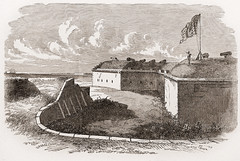
March 3, 1861 General P. G. T. Beauregard arrives at Charleston and assumes command of Confederate troops

March 2, 1861 The U. S. Congress passes a proposed 13th Amendment that would shield “domestic institutions” of the states from the federal constitutional amendment process and from abolition or interference by Congress. Although the Corwin Amendment does not explicitly mention slavery, it is designed specifically to protect slavery from federal power. The amendment is [...]

March 1, 1861 P. G. T. Beauregard appointed Brigadier General and is ordered to Charleston by Jefferson Davis. Congress organizes two new territories, Nevada and Dakota, and passes the Morrill Tariff Act, which raises taxes on imports. The U. S. Congress rejects the Washington Peace Conference proposals.

February 28, 1861 The House passes a measure supported by President-elect Lincoln which prohibits the federal government from interfering with slavery in states where it exists. North Carolina voters reject the call for a secessionist convention by 651 votes.

February 27, 1861 The Peace Convention proposes six constitutional amendments to Congress—most relate to the impasse over slavery. None passes. The House of Representatives rejects a call for a constitutional convention and the Crittenden Compromise.

February 25, 1861 President-Elect Lincoln meets with both houses of Congress The Saratoga, a ship in the U. S. African Squadron, captures the sloop Express, a slave ship

February 23, 1861 Abraham Lincoln arrives secretly in Washington after the discovery of a potential assassination attempt that was to have taken place as the Lincoln party traversed Baltimore. The President-elect’s clandestine journey is lampooned by a number of newspaper cartoonists, who inflate wild rumors that he was disguised as a Scotsman. Texas citizens ratify [...]

February 20, 1861 P. G. T. Beauregard resigns from the U. S. Army. President-elect Abraham Lincoln and Vice-president-elect Hannibal Hamlin of Maine meet in New York City

February 19, 1861 Maryland Secession convention ends without a declaration of secession. Jefferson Davis appoints his Cabinet including fireeater Robert Toombs (State), Christopher Memminger (Treasury), LeRoy Pope Walker (War), Judah P. Benjamin (Attorney-General) and J. H. Reagan (Postmaster-General).

February 18, 1861 In Montgomery, Alabama, Jefferson Davis is inaugurated as the provisional President of the Confederate States of America. Maryland convenes a secessionist convention in Baltimore to consider its options.
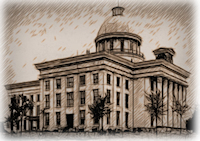
February 15, 1861 Provisional Confederate Congress votes to take Ft. Sumter and Ft. Pickens (FL) by force if necessary passes a resolution to appoint commissioners to the USA to negotiate friendly relations Delegates from Texas arrive at the Convention of Seceding States (now the Provisional Congress of the CSA)

February 13, 1861 A Joint Session of Congress meets to count and certify the Electoral College votes. The U. S. Electoral College makes Lincoln’s win official. In Richmond, former President John Tyler and former Virginia governor Henry Wise lead the notables who meet for the first time as Virginia’s secessionist convention.

February 11, 1861 The Electoral College begins to meet amid fears of a show of force against the election of Abraham Lincoln. General Winfield Scott reinforces the city and the meeting occurs as planned. Vice-president John C. Breckinridge declares Lincoln the winner of the Election of 1860. (Joint session of Congress will meet to count [...]
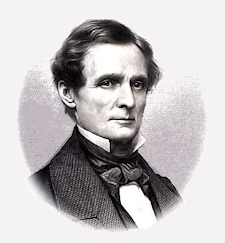
February 10, 1861 At his plantation home outside Vicksburg, Jefferson Davis receives the news by telegram he is the first President of the Confederate States of America. He was hoping to be the commander of the military.

February 9, 1861 At the Confederate convention at Montgomery, Alabama, after privately considering William Yancey, Howell Cobb, Robert Toombs, Alexander Stephens, and Robert Barnwell Rhett for President of the Confederate States of America, the Convention settles on Jefferson Davis. They select Alexander Stephens, both pro-Union and a friend of Abraham Lincoln, as vice-president. In a [...]

February 8, 1861 The Convention of Seceded States adopts a provisional constitution forming the Confederate States of America. The document contains only a few variations from the U.S. Constitution, among which are a clause protecting slavery and one that prohibits tariffs designed to protect domestic industry.

February 5, 1861 “Fort Sumter will not be surrendered” messages came from various people in the Buchanan Administration in response to a demand for surrender from South Carolina

February 4, 1861 Washington Peace Conference (also called Convention or Congress) convenes In Montgomery, Alabama, delegates from six break-away U.S. states meet in Convention of Seceded States. Georgian Howell Cobb is elected President of the Convention. John Slidell and Judah Benjamin of Louisiana withdraw from the U. S. Senate Elections in Virginia create a pro-Union [...]







